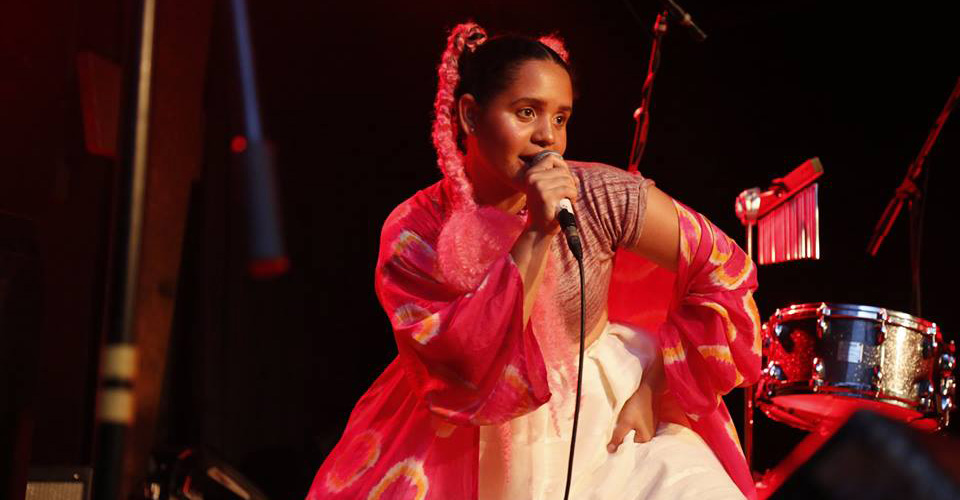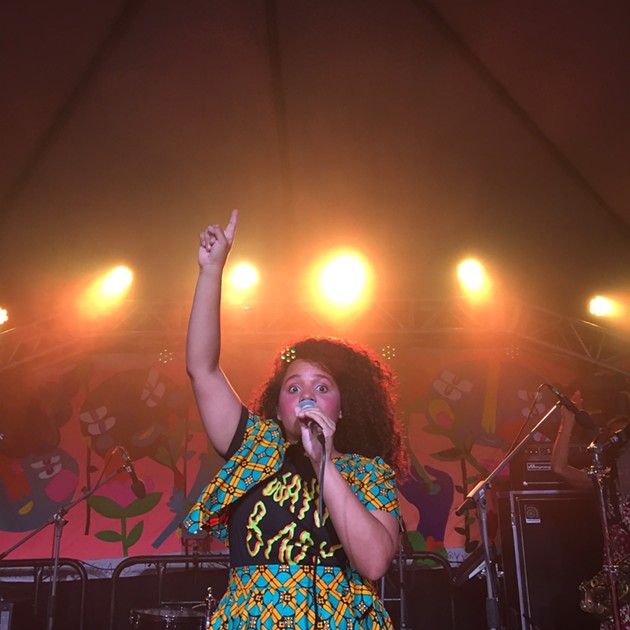
On October 19, Colombian-Canadian singer Lido Pimienta performed at the 25th annual Halifax Pop Explosion (HPX) music festival.
At her shows, the Polaris Prize winner customarily invites women of colour, trans people, disabled people, and white women to come to the front of the stage. Following this reconfiguration at Halifax’s Marquee Ballroom, a heated back and forth involving several women of colour and a white woman became loud enough to interrupt her a capella duet with African-Nova Scotian singer Kirsten Olivia. Pimienta stopped the performance twice, until the white woman — later identified as a volunteer photographer for the festival — was removed by security. The volunteer left, and the show went on.
Unless you were at the show or live in Halifax, it’s unlikely this was on your radar until a week later, when the festival’s vice-chair posted a public apology to Facebook on behalf of the festival, addressing Pimienta and the women of colour in attendance.
The Canadian Press’ David Friend wrote a report about the incident after the festival had released an apology for “overt racism.” The CP piece was picked up by every major national news site in the country. Within days, the story was international — and so was the divisive reaction, with avid supporters of Pimienta bumping up against many who found her choice to prioritize women of colour more offensive than empowering.
Versions of the story were published on sites like Tucker Carlson’s The Daily Caller, whose piece was reprinted on Alex Jones’ Infowars. Those rushing to the photographer’s defence, including The Rebel, even compared her refusal to move to Rosa Parks’s refusal to sit at the back of the bus.
But in all of this, the media has missed some crucial details, and in the process failed to properly contextualize the incident.
Nearly three weeks later, few know the name of the volunteer photographer who sparked the dispute when she refused to step back, while Pimienta has been subjected to hundreds of daily messages and comments shaming and threatening her and her family with death, rape, and other forms of violence.
“I think I asked for [the photographer’s] name, but they wouldn’t talk about anything,” says the CP’s Friend, of the festival’s reluctance to add any details to the spare account of the incident in their Facebook post.
“That’s sort of one of the things that stands out. The apology was issued, but nobody really wanted to add anything more to it.”
Prior to national and international coverage, the Halifax Examiner published an October 22 feature about the incident entitled “Lido Pimienta happened,” placing it behind their paywall.
Journalist Maggie Rahr named and featured comment from the volunteer photographer, Kate Giffin:
“Do I regret yelling? Definitely. Should I have reacted differently? Definitely,” Giffin admits, but maintains, “I don’t feel like the way I was treated was appropriate, but nobody will ever see it that way because I’m white.”
Pimienta asserts that Giffin’s removal was due to her conduct — not her skin colour. In an October 31 statement on Facebook, Pimienta said the photographer was asked to leave “because she brought violence to my show, in an area surrounded by people that have to deal with this kind of violence in their everyday lives.”
“It’s my duty to provide a safe space for my audience, and when that’s violated, I do get involved,” she continued.
Rahr says she was at the HPX show and saw what happened from a distance.
“No other media had reported on it!” says Rahr. “I treated it as any other story and set about investigating what happened.”
“When the name of the photographer came up — from many people who were right at the front — I contacted her via Facebook, asking for comment.”
Giffin is a local music photographer, known by many in the Halifax music scene (but who is not to be confused with a New Brunswick photographer by the same name).
In the time I lived in Halifax while attending university, I became acquainted with her, going to many of the same events and parties; she’s even posted a couple of photos of a friend and me at events she’s covered. If you’re a musician in Halifax, or have toured there, it’s not unlikely that she’s photographed you.
Since the October 19 show, dozens of people in Halifax and beyond have asked on social media for her to come forward and apologize. At first, many referred to her obliquely, pointing out that most people knew the volunteer’s identity — and then, later, directly tagging her in posts. This evoked discussion about the difference between calling people in (reaching out personally to ask they take responsibility), as opposed to calling them out publicly, and arguing whether or not it was productive to name Giffin.
Photos have also recently circulated of Giffin, in blackface, dressed as Bootsy Collins for Halloween 2012.
It’s vital to acknowledge how race plays a role in who has the privilege of being obscured from a narrative. Pimienta is the face of national and international coverage, while Giffin’s name was left out of the statement posted by HPX and virtually all of the subsequent coverage.
(In June, when Nikki Samuel, a white woman, caused a scene in a Mississauga clinic by demanding a “white doctor” treat her son, media across the country opted to blur her face. The anonymity was ostensibly given in order to protect her son, but as Toronto Star columnist Vicky Mochama later observed, editorial decisions like these only serve to uphold whiteness. “What of the people of colour who face someone like her every day? Who protects their children?” she wrote.)
The polarizing nature of this story coupled with Pimienta’s hyper-visibility has undoubtedly only worsened the abuse she’s received.
Julia-Simone Rutgers, featured in the CP article, took issue with the reporter’s framing of the incident.
“It does not reflect the discomfort that the [women of colour] at the front of the room were feeling,” says Rutgers.
She says Giffin was to the right of her, when she saw that Giffin was in the way of Black and brown women trying to come to the front. Rutgers and her friend, a trans woman of colour, asked that Giffin move back to make room.
“Her immediate response was to raise her voice at us and tell us she didn’t have to move…and she began to scream that she had a right to be there,” says Rutgers.
“At no point can I remember her actually mentioning that she was a volunteer for the show,” she says, “but she kept pointing to other photographers in their designated section of the stage and asking why we weren’t making them move, too. She kept yelling ‘You don’t fucking know me’ and refusing to share the space.”
In her October 31 statement, Pimienta mentioned that “there was a dedicated media/photographer area that this photographer declined to use at this show for whatever reason.” CANADALAND reached out to HPX for confirmation of this, but the festival’s publicist, Trevor Murphy, says they are not currently giving comment or interviews.
Rutgers’s friend managed to motion to a performer on stage with Pimienta, communicating that there was an issue with someone up front. “When Lido asked ‘Who’s fighting at my show?’ we all pointed to Kate,” says Rutgers.
Pimienta asked Giffin to move back, but she stayed at the front “screaming” at Rutgers and other women.
“Eventually, Lido had to interrupt the show a second time to ask security to escort Kate out,” says Rutgers.
CANADALAND spoke to two others who witnessed the altercation, who confirmed Rutgers’ account. (Pimienta’s management, however, says that the artist herself did not call security.)
Giffin did not respond to multiple requests for comment.
Thank you!
He has put my life in real danger. He has started something horrible….— Lido Pimienta (@LidoPimienta) October 29, 2017
Pimienta replied to Rutgers on Twitter, thanking her, after pointing out what she saw as misrepresentations in Friend’s article, adding that the report “has put my life in real danger. He has started something horrible….”
Friend says he wanted to include Pimienta in the piece, “but her management didn’t get back to me in time,” after reaching out to them twice on Thursday the 26th and — having held the story in the hopes of hearing back — once more the following morning.
In her Facebook statement, Pimienta clarified why she asks certain audience members to make space.
“When I ask men to go to the back,” wrote Pimienta, “I am not kicking them out, I am not telling them I hate them, I am simply inviting them to be part of a generous gesture to ensure that women are safe.”
Likely the most vital piece of context that many accounts miss concerns the demographic of her audiences — and particularly, the makeup of Halifax’s music and arts scene. When Pimienta asks people to make space, she wrote, “this affects about 10-12 people at my shows in Canada.”
“There were only a handful of people and women of colour in a room full of 800 people,” Brandon Valdivia, Pimienta’s bandmate, writes in an email to CANADALAND.
Oversimplifying the request, the CP reported that Pimienta “frequently asks her audience to welcome people of colour to the front of the stage. In turn, she requests that white people move back.”
“[Friend] doesn’t give [an] open analysis of why she invites BIPOC [Black, Indigenous, people of colour] and trans people and differently abled to the front,” writes Valdivia.
This may explain the many enraged, harassing responses referring to her prioritization as “segregation” and/or “reverse racist.”
Instead, Pimienta wholeheartedly believes that making space is an opportunity to stand in solidarity. “When we make space for women of colour, we are saying ‘we see you, we love you, we appreciate you,’” she wrote.
She first asks all women to move to the front, and for men to step back. For older punks and feminists, this may sound familiar. Kathleen Hanna, lead singer of Bikini Kill and pioneer of the feminist-punk Riot Grrrl movement, is known for her “girls to the front” policy. At shows in the 90s, Hanna would demand men move back and make room for women at the front, and she’s now thrown her support behind Pimienta.

“So sorry all these racist assholes are messing with you. Sending love and support your way,” Hanna wrote in a Twitter message to Pimienta last week.
Once women have moved forward, Pimienta then asks women of colour, trans people, and disabled people to come to the very front of the stage — meaning many white women are asked to move a bit back to make space.
Pimienta explained that prioritizing women of colour in no way means she does not care about white women. “I am trying to show that white women have an easier time navigating the world than do coloured women,” she wrote, adding that whiteness “allows them to enjoy more advantages and a relatively higher level of safety.”
I saw Pimienta headline Sappyfest in Sackville, New Brunswick, in August. She played for a majority white crowd. When she began rearranging the audience, it was well received, with each call to move forward being met with cheers and cooperation. Giffin photographed Pimienta throughout the performance.

Steven Lambke, the creative director of Sappyfest, made a public post to his personal Facebook page in support of Pimienta on October 29. He says that although he was not at HPX, when Pimienta called people to the front at Sappyfest, “It was a beautiful moment, creating, as she had all weekend, a safe space.”
Since Pimienta has been the face of the event’s coverage, she’s been on the receiving end of the majority of threats and vitriol, too, says her bandmate Valdivia.
“We think it’s absolutely imperative for [Kate] to make a statement apologizing to Lido and to the BIPOC, trans, queer people that were in the front,” writes Valdivia, pointing out that “the silence is protecting, of course, the white woman.”
Pimienta declined to comment for this article but said she agreed with Valdivia’s statements.
Pimienta will be back in Halifax at the Spatz Theatre on December 6, performing as part of the New Constellations national tour, featuring Indigenous artists and musicians, including A Tribe Called Red and Leanne Betasamosake Simpson.
Note: A young woman of colour, who was in attendance the night of the show, contributed to this article but has asked to remain anonymous due to the extent of the harassment Pimienta has been receiving.
Top photo by Ruthie Titus, via Pimienta’s Facebook page.
Update (Nov. 9, 2017, 2:00 p.m. EST): After this article was published, Pimienta’s management contacted CANADALAND to state that Pimienta herself did not call security at the concert. We have amended the piece to note this, as well as to clarify that CP reporter Friend made more than one attempt to reach out to Pimienta through her management prior to publishing his story.